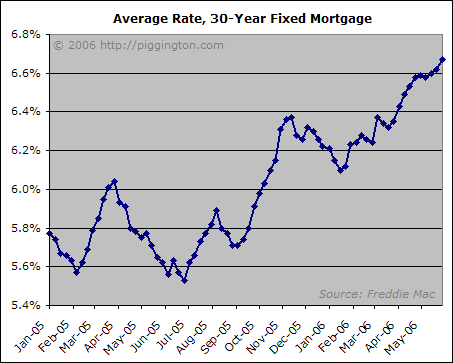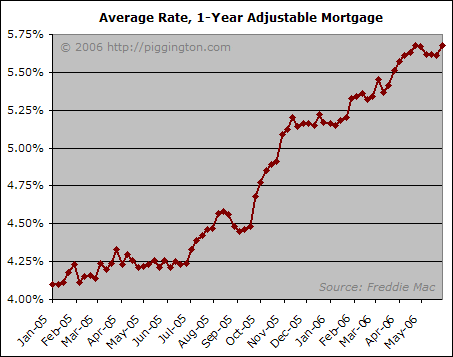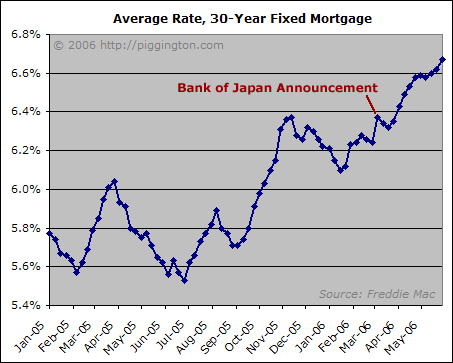(Click here for an audio version of this article).
The upward surge in mortgage rates has continued, and as of now both fixed and adjustable mortgage rates are sitting atop their multi-year highs:


Will ARM Rates Keep Rising?
ARM rates are heavily influenced by the actions of the Federal Reserve, which controls the interest rate on short-term debt. And there is an awful lot of speculation that the Fed’s most recent rate hike was its last. This could well be true, and both sides of the debate have compelling arguments.
The "pause" school of thought says that the Fed is aware of the lag time between rate hikes and the results thereof. Given that knowledge, along with the burgeoning slowdown in housing, stocks, and some sectors of the economy, the "pausers" maintain that the Fed will stop hiking.
The opposite camp claims that there’s no way the Fed can pause with gold over $600, oil around $70, and a growing general fear that inflation is taking hold. The "hikers" insist that the Fed would much rather cause short-term economic pain than to let the inflation demon loose.
For what it’s worth, I could go either way. There is clearly an inflation problem, what with gold and commodities climbing as they have. But the Fed may note that gold and commodity prices have taken a beating in recent weeks, and use that fact to declare victory over inflation. I have my opinions on what they should do, but I really don’t have a strong opinion to what they will do. I prefer to stay out of this particular debate and just see how the new guy handles himself.
One thing we do know for sure is that the Fed is not going to actually lower rates any time soon. So short rates may rise and hurt the housing market even more, or they may flatten and become a non-issue. But don’t look for short rate movements to actually help the housing markets in the coming months.
It’s important to keep in mind that the Fed funds rate isn’t the only factor influencing ARM rates. General liquidity—the amount of money that is out there to be lent—exerts a big influence as well. For a long time, excess liquidity kept ARM rates fairly flat despite a rising Fed funds rate. Now, as I will discuss in the next section, that liquidity is being removed. The net result could be a rise in ARM rates even if the Fed goes on hold.
Another risk to short rates is the impending federal regulations on exotic loans. These new rules are due within the upcoming months and could limit the use of many of the mortgage products that helped keep those initial (i.e., pre-mortgage reset) ARM rates so low.
Will Long-Term Rates Keep Rising?
There is much argument about the reason for the recent surge in long-term rates. I believe the most likely culprit has been the Bank of Japan’s move towards monetary tightness. I described this situation two credit market reports ago:
The big news in the credit markets last month was the announcement by the Bank of Japan (BOJ for short—Japan’s central bank) that they would end their policy of “quantitative easing.” A little background: when the BOJ cut rates to 0% and still didn’t manage to kick-start inflation, they tried something new. They started printing money like mad and handing it over to banks to use as reserves, presumably to spur lending, which would in turn spur economic activity.
How well that approach did or did not work is a whole other topic and is not relevant to our discussion. The point is that the Japanese were creating huge amounts of money, and much of that money ended up being lent to Americans through avenues described elsewhere on this site. The net effect was to help keep both rates and lending standards nice and low.
Now the BOJ finally appears to be confident enough in the economy to lay off the printing presses. They have announced their intent to start mopping up the excess liquidity and, eventually, to begin raising rates. It may be many months before the first rate rise even takes place, but the point is that the BOJ is finally moving towards relative credit tightness.
The BOJ’s move only underscores a general tendency towards worldwide tightening. The US Fed is of course still raising rates, and regulators are starting to discourage banks’ more risky lending practices. And now the European Central Bank has jumped on board, raising its own target rate for the second time and waxing concerned that, “A large liquidity build up has developed and we can’t ignore it.” (The ECB has a much better handle than the Fed on what does and does not comprise “inflation”—but that is also a topic for another article!)
In all likelihood, this tightening of worldwide credit conditions will result in less money to be lent and higher rates at which to lend it. The extent of these effects is of course impossible to predict, but their general nature is not.
Sure enough, fixed mortgage rates went on a three-month tear after the BOJ announced the end of quantitative easing:

The BOJ is not finished removing all of the excess liquidity from the system, and they have not even started hiking rates. So there may be further rises to come for long-term rates. However, we’ve also got a situation where stocks are getting hammered and the housing slowdown is starting to take a toll on the economy. These factors could put some downward pressure on "safe haven" Treasury yields; however, mortgage debt is less of a safe haven so I’m not sure how much mortgage rates would benefit. We will have to see which factor wins out. For the time being, though, the trend in long-term mortgage rates appears to be "up."
Rates and Rates of Change
People argue that home prices are unlikely to decline because rates are still historically rather low, but that makes little sense. The raw level of rates is irrelevant in determining future price movements. What matters in this case is the directional movement of rates. If rates are historically rather low, that actually strengthens the case that they could rise to more normal levels and thus put downward pressure on home prices in the future. If that happens it will clearly not be good for home prices.
We need look no further than the current environment to see this dynamic at work. Last year at this time, the permabulls were telling us that home prices wouldn’t decline because rates were nice and low.
Well, look what’s happened since then. The table below measures the effects of rate changes by comparing the carrying costs on a mortgage today vs. one year ago. Assume a loan of $500,000, because this is a typical loan you might take out to purchase a middle-of-the-road single family home, but mostly because I like round numbers.
|
June 2005
|
June 2006
|
Difference
|
|
|
Loan Amount
|
|
$500,000
|
–
|
|
Rate, 30-Year Fixed
|
5.6%
|
6.7%
|
+20%
|
|
Rate, 1-Year ARM
|
4.2%
|
5.7%
|
+36%
|
|
Payment, 30-Year Fixed
|
$2,870
|
$3,226
|
+12%
|
|
Payment, 1-Year ARM
|
$2,445
|
$2,902
|
+19%
|
Monthly payments on a given loan amount are around 12% higher for fixed-rate loans and 19% higher for adjustables than they were at this time last year. Conversely, a buyer with a maximum monthly budget must make do with a home that is 11% less expensive (for fixed mortgage users) or 16% less expensive (for ARM users) than they could have bought last year. That translates into a decline in purchasing power, plain and simple. It’s just that much harder to buy homes at these ridiculous prices. Last year’s unnaturally low rates were far from the blessing that the bulls would claim—they were a curse, because such low rates were destined to rise to levels that would put downward pressure on future home prices, as they have done.
Does It Matter?
As far as the continued health of the housing market is concerned, in a sense it makes no difference whether rates keep rising. Even if rates flatten out now, they’ve already risen enough to inflict some serious damage on the sustainability of home prices at current levels.
As rates and high prices have rendered housing less and less affordable, many people have taken to using "suicide loans" that exchange lower initial payments for higher payments down the road. This has blunted the impact of higher rates, and without such loans we would have seen a lot more weakness in home prices over the past year. But with liquidity drying up and federal regulators going after risky lending practices, exotic loans could become less prevalent (and less helpful to housing prices) going forward. And even as common as exotic loans have been, they still haven’t prevented home prices to start drifting downwards and sales volume (especially in the entry-level market) to go to hell.
The point is that rates do not have to go up from here in order for the housing bubble to continue deflating. The rise in rates we’ve seen over the past year, combined with continued home price weakness and the populace’s slowly (and I do mean slowly) dawning realization that the housing market may be in trouble, is enough to keep the pressure on housing prices to the downside.
If rates continue to rise as they have, that will obviously make a bad situation worse for home prices. But even if rates flatten out, the party will continue to be over. It would take a pretty steep rate decline to reinvigorate this languishing housing market, and, for all the reasons I outlined above, I just don’t think that’s in the cards. The only question for the near term is whether we will stay at bad or go to worse.
